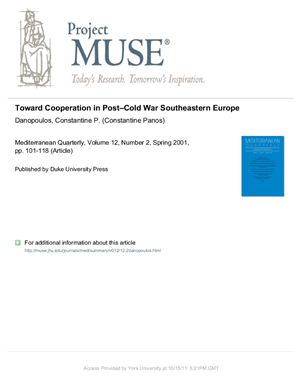Mediterranean Quarterly, Volume 12, Number 2, Spring 2001,
pp. 101-118 (Article)
Published by Duke University Press
The disintegration of Yugoslavia and the subsequent caage in Bosnia and
Kosovo—along with a plethora of social, economic, and other difficulties—
have left the distinct impression that southeaste Europe, more commonly
known as the Balkan Peninsula, has lost none of its penchant for turbulence.
Scholars, joualists, and practitioners alike have agreed that the Cold War
temporarily suppressed but failed to resolve ancient ethnic and other conflicts.
These analysts have held little hope that the powder keg of Europe
would be able to escape the legacy of its bloody history.
pp. 101-118 (Article)
Published by Duke University Press
The disintegration of Yugoslavia and the subsequent caage in Bosnia and
Kosovo—along with a plethora of social, economic, and other difficulties—
have left the distinct impression that southeaste Europe, more commonly
known as the Balkan Peninsula, has lost none of its penchant for turbulence.
Scholars, joualists, and practitioners alike have agreed that the Cold War
temporarily suppressed but failed to resolve ancient ethnic and other conflicts.
These analysts have held little hope that the powder keg of Europe
would be able to escape the legacy of its bloody history.

